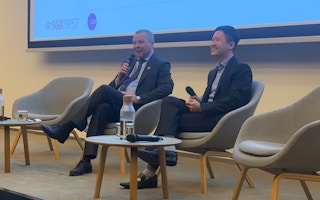A merger between the two biggest sustainability reporting standard-setters would present problematic governance issues, even as “tribal” differences have been set aside, according to the chief executive of Global Reporting Initiative (GRI).
To continue reading, subscribe to Eco‑Business.
There's something for everyone. We offer a range of subscription plans.
- Access our stories and receive our Insights Weekly newsletter with the free EB Member plan.
- Unlock unlimited access to our content and archive with EB Circle.
- Publish your content with EB Premium.
Standards bodies have been under pressure to join forces to make life simpler for the growing number of firms reporting their social and environmental impact, and for investors frustrated by the plethora of frameworks that make investing in firms based on their sustainability credentials confusing.
Speaking at an event at the Singapore Exchange on Tuesday 7 March, GRI CEO Eelco van der Enden was asked why GRI hadn’t merged with the International Sustainability Standards Board (ISSB), another major reporting standards body, as the two entities have complementary mandates and have already signalled a much closer working relationship.
A memorandum of understanding was announced between ISSB and GRI to bring more harmony to sustainability disclosure in March last year. The MOU came 10 months after two other standards, Sustainability Accounting Standards Board (SASB) and the International Integrated Reporting Council (IIRC), merged to bring more “clarity and simplicity to the corporate reporting landscape.”
Van der Enden said he was “quite bullish” about a merger, and there had been discussions about it, but differences in their mandates presented governance issues that would make combining the frameworks impossible.
The International Financial Reporting Standards Foundation (IFRS), the organisation behind ISSB, is more focused on “financial materiality”, or the financial effects of sustainability issues on businesses, whereas GRI is more focused on “impact materiality”, or the impact of corporate behaviour on the environment and society, he explained.
These differences would present a governance “hiccup” if the two entities were merged, he said.
Speaking to Eco-Business on the sidelines of the event, van der Enden said that a merger would only work if the mandates of the two entities were reviewed, or a structure was created for them to be closely aligned operationally but co-exist as independent organisations.
“But then how to move [a merger] along? It takes two to tango,” he said.
“Mergers are not only about business logic, they’re about emotions,” he added, pointing out that both GRI and IFRS had been around for more than 20 years.
The Dutch national, a former tax lawyer who was appointed CEO of GRI last January, said that IFRS and GRI had been perceived to be from “two different tribes” in the recent past; GRI as an “activistic” impact-oriented organisation that was not business-friendly and ISSB as purely “the voice of the capital markets”.
“That was perception and not reality. In fact, we are two sides of the same coin called business reporting.”
This has made cooperation a lot easier, he said.
Van der Enden said he speaks to, or exchanges emails with, ISSB chair Emmanuel Faber daily.
Relations between GRI and rival standards bodies haven’t always been so cordial. In 2019, former GRI CEO Tim Mohin and the previous boss of SASB, Madelyn Antoncic, openly traded barbs over which standard was superior at an event in Singapore.
Van der Enden said he wanted to work with other standards bodies to set up a “global baseline innovation lab” in Singapore, to foster closer cooperation between the standards. This lab would help to align the standards as well as build capacity for sustainability reporting in the region.
Van der Enden’s comments on harmonisation emerge as governments in the United States, Europe and Australia prepare to impose regulations on sustainability reporting to clamp down on “greenwashing” – the act of making exaggerated green claims to inflate a company’s value.
These regulations could lead to different requirements for companies reporting their ESG impact in different regions, further complicating sustainability disclosure for businesses with an international footprint.
Van der Enden said additional juristictional requirements risked fragmenting an already fragmented reporting landscape further.
“There is a serious risk of fragmentation and we should try to avoid it at all costs. Because literally no one benefits from fragmentation, because it will lead to more non-comparable information,” he said.
Van der Enden called on regulators to keep faith with what companies are already using to report their environmental and social impact, noting that 11,000 companies are using GRI standards globally.
“Why reinvent the wheel when there is proof of concept? I strongly advise regulators to use the ISSB and GRI formats as the basis to implement regulations in local jurisdictions,” he said.
Most companies are already using these frameworks, which would lower the cost of compliance and make it easier for external auditors to weed out greenwashing, he said.










